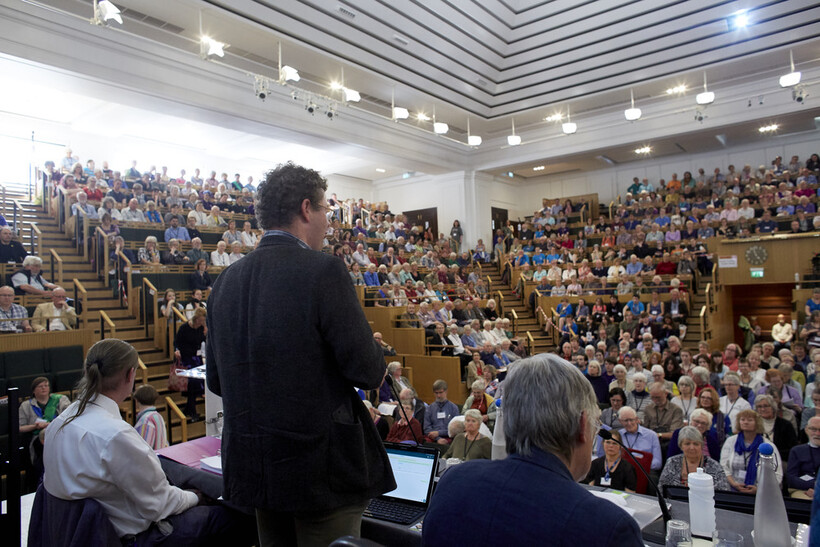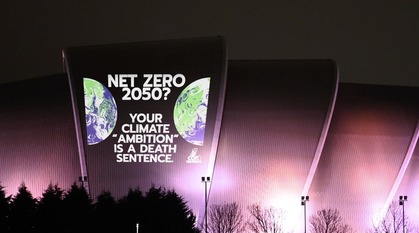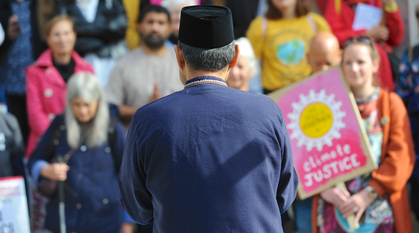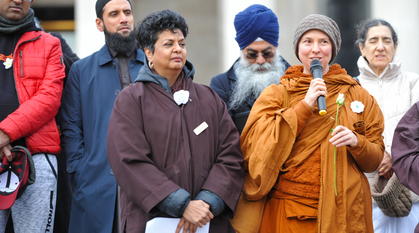Living adventurously: a decade as Recording Clerk
Paul Parker was appointed Recording Clerk for Quakers in Britain on 1 May 2011. Here he reflects on a decade as Quakers' senior staff member.

Ten years ago I took a deep breath and sat at my desk in Friends House for the first time. I'd never run an organisation before, and never worked outside the public sector. But I brought my experience of school leadership, several years of Quaker committee work and volunteering, and a sense of hope and a determination that Quakers should thrive in the 21st century.
Talk about 'living adventurously'! In fact, number 27 in our Advices & queries has always felt to me like the Recording Clerk's job description in a nutshell.
[QUOTE-START]
"Live adventurously. When choices arise, do you take the way that offers the fullest opportunity for the use of your gifts in the service of God and the community? Let your life speak. When decisions have to be made, are you ready to join with others in seeking clearness, asking for God's guidance and offering counsel to one another?"
- Advices & queries 27
[QUOTE-END]
A decade has since flown by, and I'm looking back at what's happened – and asking some questions to think about for the future.
2011: our Canterbury Commitment
Yearly Meeting committed 'to become a low-carbon, sustainable community' soon after I started. Still a work in progress, it led meetings to look at their buildings and Friends to look at their own lifestyles. I gave up my car when I started this job, but have realised that it will take much more than individual action to avert disaster.
Ten years on, with climate change ever more pressing, we are preparing for the UK to host the UN's COP26 summit in Glasgow. Quakers are advocating for a just economic system that sustains people and planet, and Friends have been involved in climate protests of many kinds.
This summer, climate justice will be on the agenda of Yearly Meeting again. How far have we really come?
2012: Sixth World Conference of Friends
In April 2012 a thousand Friends gathered in Kabarak, Kenya. For me this was a first encounter with Quakerism outside our European liberal tradition, a profound experience of finding unity across differences.
We struggled to encounter one another across gulfs in theology, culture and language. Out of it came the remarkable Kabarak Call for Peace & Ecojustice (PDF) and a sense of being gathered as a world community of Friends. The image that stuck with me, though, was the pile of handmade bricks stacked up at the back of a small rural Friends Church I visited – the investment its members were individually making in the growth of their community.
How are we investing in our own future as British Quakers?
2013: divestment from fossil fuels
For me this was a year of visiting meetings around Britain, talking about how Quakerism could 'go Whoosh!' and be revitalised for the 21st century.
Nationally, we addressed the question of whether Quakers should divest from fossil fuels. Quakers were the first church in Britain to do so, and our example has since encouraged many hundreds of other institutions of all shapes and sizes to do the same. This decision was another step in Quakers' long commitment to the ethical use of money.
What does our use of money say about our values?
2014: the first same-sex marriages
The first same-sex marriages in the spring of 2014 were built on five years of work to get the law to match Quakers' 2009 decision to marry same-sex couples. After the crucial votes in parliament, a member of the House of Lords wrote to me to say that without the Quakers, religious same-sex marriages would never have happened. Another member came out during the debate in the Lords, as a result of reading Towards a Quaker View of Sex fifty years earlier.
It wasn't over though: couples in civil partnerships had to wait a few months longer to marry. Despite our best efforts, one civil partner died before this was possible. I still remember us both crying down the phone when the civil servant responsible for the new regulations rang to say that even though they'd tried, they weren't going to be in force in time.
2015: the first Yearly Meeting in The Light
After two years of works, the refurbished Large Meeting House at Friends House in London reopened. I sat at the clerks' table, and watched Friends' jaws drop (literally) as they walked in and saw the new space, known commercially as The Light, with its dramatic skylight. Not everyone fell in love with it straight away, but it won a RIBA award for its sensitive and innovative design.
It has gone on to generate several million pounds worth of conferencing business, as well as providing an inspiring space for us to hold Yearly Meeting.
Does architecture matter? How can we best use Quaker assets to support Quaker work?
2016: the Quaker Meeting Houses Heritage Project
Quakers across Britain welcomed architectural historians into their meeting houses as part of the project undertaken in partnership with Historic England. We learnt a lot about the 345 Quaker meeting houses they visited, and their distinctiveness in the streetscapes of towns and villages.
It's also prompted lots of discussions about what our meeting houses are for, how many we need, and how they serve the spiritual life of Friends. The pandemic has changed our perspective on this again, of course.
How important will premises be for Quaker worship, witness and visibility in the future? How can we make sure our meeting houses are a joy, and not a burden?
2017: examining the barriers to greater diversity
Yearly Meeting at Warwick minuted a 'call to examine our own diversity' and asked for work on removing barriers and actively seeking wider participation in the full life of our meetings. Work on engaging young adult Quakers followed, with many young Friends groups emerging.
A survey revealed that we might be more diverse than we think, but also showed that there are issues of racism and other kinds of discrimination – both individual and systemic – which need sustained work. We still don't have a shared vision of what a truly diverse Quaker community could be like, and are the poorer for that failure of imagination.
What needs to change to make that a reality in our meetings?
2018: beginning the revision of Quaker faith & practice
Our book of discipline – our key Quaker text – was last revised between 1985 and 1994, and it was beginning to show. At Yearly Meeting it was described as a pot-holed road, covered in patches.
The work of producing a new book for a new generation of Quakers has begun again, as it has every couple of decades since 1837. I ended up on the Today Programme at seven o'clock in the morning on the last day of Yearly Meeting to explain how Quakers talk about their faith, and why we won't be abandoning God just yet!
What should we keep, what should we jettison, what should we add?
2019: local development workers
After several years of research, listening to Friends, prayerful discernment, and a three-year pilot, Quakers in Britain agreed a big shift. After being London-based for around 350 years, we knew it was time to take Quaker work to Quakers where they are.
Working with Woodbrooke, we designed a programme of local development workers who will work with local and area meetings across the country to help them flourish. Supporting them on everything from governance to activism, from deepening worship to supporting role-holders, by spring 2022 there will be a local development worker within reach of every meeting in Britain.
How will your meeting work with yours? What can they do to help you be more confident, better connected and supported?
2020: Quakers go digital
In some ways, the less said about 2020 the better! But amid the challenges of the pandemic, we can definitely say that 2020 was the year Quakers went digital.
Around three-quarters of meetings for worship went online, along with all our committee meetings, Yearly Meeting and Meeting for Sufferings. Some Friends felt excluded by the technology; others were fully included for the first time. Friends House and Swarthmoor Hall were closed and unable to generate income.
A year into the pandemic, lots has changed. We still don't know what it all means for how Quakers will meet, worship, witness and build community together in the future. We do know it's possible to do things differently, and perhaps more simply, too. What will it mean for your meeting, in five years time? In ten?
2020 was also the summer of Black Lives Matter. Both Meeting for Sufferings and BYM Trustees minuted a determination for us to become an actively anti-racist faith community, and began the long, hard work of figuring out, and then acting on what that means for Quakers.
2021: it's not over yet
Ten years in, the work goes on. The new Quaker hub in Leeds opens in May, moving some staff nearer to local Quaker communities. Quakers will be making themselves heard at COP26 in Glasgow in November. Quaker advocacy for the human rights of migrants, the right to protest, the demilitarisation of society and the abolition of nuclear arms continues. The work of simplifying our complex structures has begun, too.
It has been a privilege to serve you all for the last ten years. Throughout it, I have been inspired by the Friends I have met. Whether hesitant or confident, vocal or silent, supportive or critical, activist, mystic or pragmatist, spiritual adventurers all, each of you has provided insights which nudge us closer to being able to discern the will of God for our community, our work and our world. Thank you.


